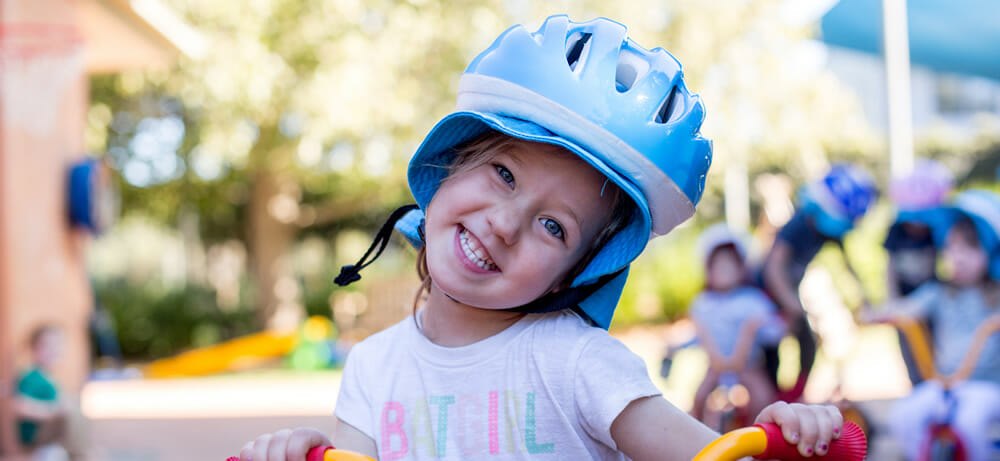
Moving to a healthier lifestyle.
We all know how important exercise is in our lives, we hear the government health advice and all the benefits, but knowing it and putting it into practice are two very different things. Especially when you’re busy balancing life with family and work demands and you want to instill healthy habits with your child for their short and long-term development and well into their future. But how do you do this?
Firstly, here’s a reminder of some things we may already know including the benefits of exercising, some things we may not have thought about, and some tips and tricks to getting started.
Benefits of exercise
Physically active play should be encouraged from a very early age as this helps with your child’s overall development. The younger child learns to master their body and develop physical skills at a rapid rate. Our educators are skilled at providing encouragement, support, praise and guidance as well as celebrating important milestones such as rolling, sitting, crawling, walking and eventually running, jumping, climbing and balancing. Our educators nurture these physical skills by engaging and participating with your child in their play – there is nothing more amazing than seeing a child master a new skill that was challenging at first like taking their first steps, learning to jump or even skip. Plus, did you know that in order for your child to hold a pencil they must first have good control of their gross motor skills? Before they can grip and control scissors, their large muscles need to be developed.
Our Early Childhood Educators are trained to enhance your child’s learning and development. We include physical development opportunities and challenges throughout their day at all our centres to achieve this.
When children play vigorously or participate in sports, their brains and bodies are more able to focus and engage with literacy learning times, science experiments, problem solving challenges, group collaborations, class discussions and positive communication with others. We focus on the development of your child’s gross motor skills, cognitive and social skills.
Benefits include:
- Helping your child to pick up new skills and challenge them
- Strengthening their bones, muscles, hearts and lungs
- Improving coordination, balance, posture and flexibility
- Helping keep them at a healthy weight (reducing the risk of diabetes type-2, cancer and heart disease)
- Better sleep (this one should resonate with most parents!)
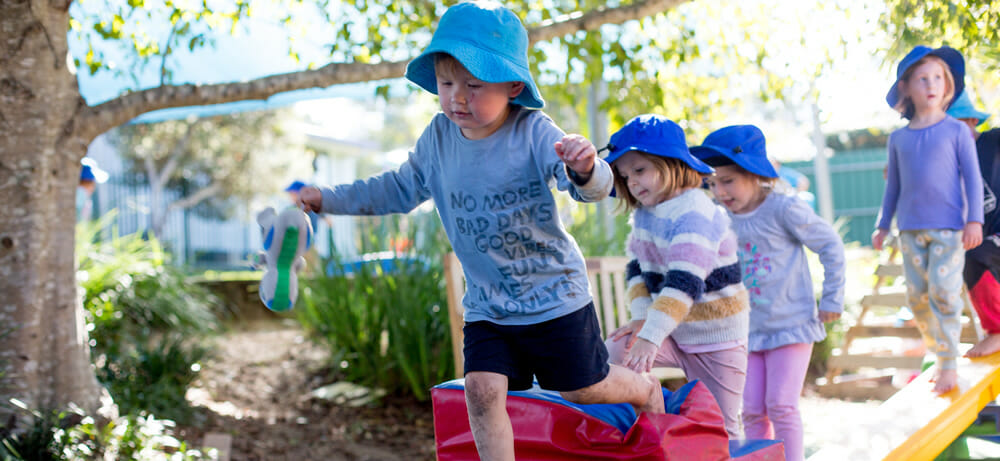
Tips for incorporating exercise into your daily lives
Here are just a few ideas to help you make exercise a part of your everyday lives, keeping your family fit and healthy and forming life-long habits for your child. There are many opportunities both indoors and outdoors for your child to run, jump, leap, skip, climb, dig, dance and hop.
- Provide opportunities and space for your child to play, whether it’s at home, the garden or a park.
- You can start including your child in outings from when they are a baby in their sling, carrier or pram – get them used to being out and about.
- Where possible, walk your child to school, walk upstairs instead of taking lifts or escalators.
- Get active together as a family – go for beach or bush walks on mini discoveries, bike rides, swimming or jumping over the waves, kick a ball around or fly a kite on a windy day.
- Encourage your children to play games such as follow the leader, dance with ribbons and instruments, balance over obstacle courses or hang from monkey bars. (Obstacle courses enhance fitness, spatial awareness and coordination.)
- Try out different structured activities that you think your child would like such as dance, gymnastics, soccer and swimming.
- Be a positive role model by demonstrating a good attitude towards exercise and being active yourself – remember that your child is always watching and listening to you as their parent.
- Support your child when they start something new and encourage them with praise.
- Watch your child when they play sport or have an organised lesson.
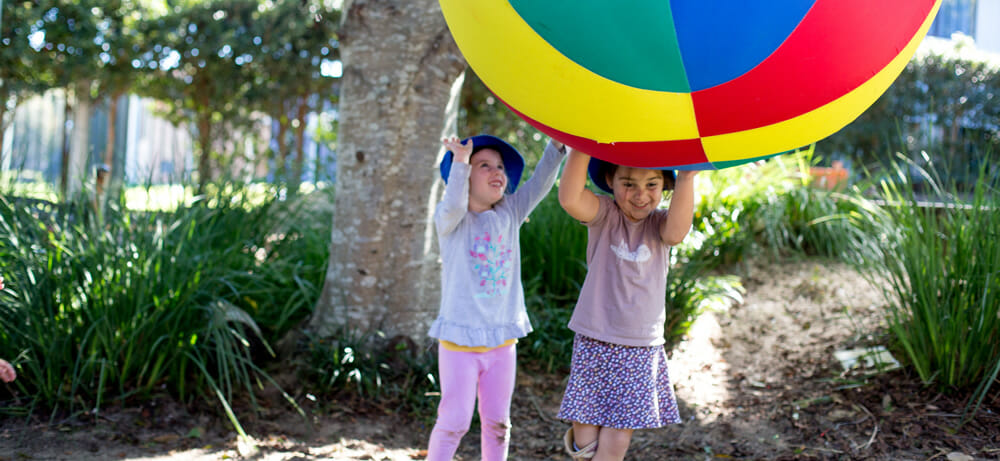
St Joseph’s Family Services Programs
Our curriculum is tailored to your child’s own interests and skill levels. Ensuring each child’s learning is at their own pace and an individual journey.
Our aim is for your child to feel confident and successful in their achievements and we celebrate their development of new skills along with them.
At St Joseph’s Family Service centres, we work in partnership with you and your child. Physical activity is an important part of our learning programs. Here are a few examples of how we incorporate it as part of our Transition to School Calendar:
- Small group sports foundations sessions incorporating Fundamental Movement Skills (FMS). This is part of the NSW Department of Health Munch and Move Program. This involves intentionally teaching 12 Fundamental Movement Skills. These 12 skills are the foundation for formal sports such as soccer, tennis, athletics, basketball and cricket. The 12 skills are running, hopping, galloping, leaping, side-sliding, skipping, underarm throwing, overarm throwing, kicking, stationary dribbling and striking a stationary ball. These experiences are incorporated into daily transitions and into sports and music times.
- Sports extensions learning incorporating TOKYO Olympics. As a part of connecting to our wider community and world we incorporate events that are nationally and globally celebrated. The TOKYO Olympics is something the children may see or hear about on the news, social media and in conversations or at sports they are involved in after school. In the past we have done our own mini-Olympics as parts of our outdoor curriculum or sports times. These have included sprinting and lap races, relays, discuss and shot put, tennis, volleyball, swimming and long jump etc.
- Scissor and writing tool skills are extended on with small muscle strength and co-ordination experiences. Small muscle experiences are incorporated into each day’s learning so fingers can gain control, dexterity and strength for writing and scissors. These activities may include:
- Playdough and clay to squash, pinch, poke and roll, using pegs and tongs
- Weaving, sewing and knitting;
- Small connecting blocks and natural materials to manipulate, sort and create with;
- Preparing fruit or cooking recipes using spoons, graters, orange squeezers, or peelers;
- Using hole punches and shape cutters, threading beads, poking straws or pipe cleaners through colanders;
- Scrunching up newspaper and throwing it at targets;
- Taking lids off small jars;
- Hammering nails into wood;
- Tearing paper, using sticky tape, using eye droppers and spray bottles with paint; and
- Self-dressing or dressing up in clothes that have buttons and zips.
We empower children to discover their own voice, strengths, achievements and challenges through play to become successful and engaged learners and to have a voice and input into their own choices and learning pathways.
For more information on our programs and our Transition to School Calendar, please contact us.
If you’d like to know more about placing your child in one our centres please give us a call on (02) 6583 6464.
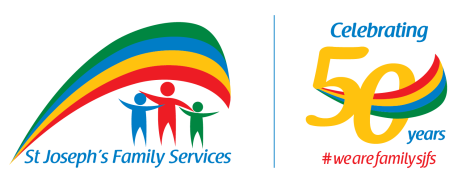

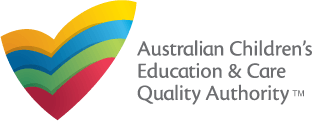

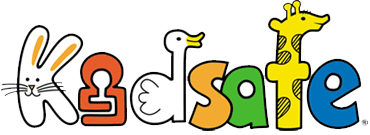

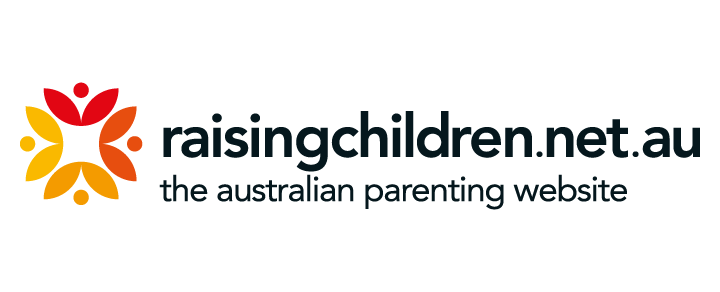
Leave A Comment